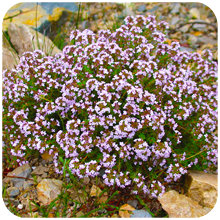
A native of the Mediterranean region but is cultivated worldwide. Subshrub of bush culture with globular lignified base and is 10-50 cm in length, stems are numerous, cylindrical, woody and gray at the base, young parts having bristle and pointing downward, leaves are petiolate, opposites and small with twisted edges, hairy on the back, flowers are small pink in color, clustered in inflorescences spiciform beside small upper leaves. Flowering twigs are collected between June and August, on dry and sunny days. The leaves are collected on dry twigs. Leaves and flowering tops are used for medicinal purposes.
Chemical composition – Contains 1-2% volatile oil rich in thymol, p-cymol and borneol, geraniol, carvacrol, linalool, bornyl acetate, α-pinene, saponins, ursolic acid, oleanolic acid and cafeic acid, flavonoid derivatives: luteolin and luteolin-7-glucoside; sterine, waxes and triterpenes etc..
Properties – Expectorant, lung and intestinal antiseptic, anti-asthmatic, sudorific, antitussive, hepatoprotective, cholagogue, choleretic, carminative, stomachic, antidiarrheal, antispasmodic, anthelmintic, antifungal, diuretic, diaphoretic, depurative, hemostatic, sedative.
Recommendations – In physical and mental fatigue, nervousness, anemia, tuberculosis, asthma, intestinal and urinary infections, influenza, angina, furuncles, rheumatism, leucorrhoea, intestinal parasites, insomnia, circulatory disorders.
This plant is incorporated in natural remedy HAPPY KID Syrup.




